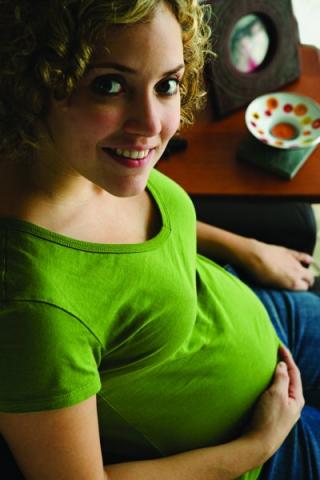Pregnant? Protect yourself and your baby against flu

Pregnant women are more likely to develop serious complications as a result of flu compared to women who are not pregnant, so the message from the Public Health Agency (PHA) is to protect yourself and your baby by getting the flu vaccine. Each year the flu vaccine protects against the three most common strains of flu and this year includes swine flu (H1N1), which is particularly dangerous for pregnant women.
Pregnant women will now be invited by their GP, no matter what their stage of pregnancy, to get the flu vaccine. Although pregnant women are naturally cautious about taking vaccines, there is now a lot of evidence that flu vaccines are safe in pregnancy. Millions of pregnant women have received the vaccine and careful monitoring has shown the vaccine to be safe for both mother and her baby.
The flu vaccine is available now and it is best to be vaccinated early so you and your baby are protected. If you become pregnant later in the winter you should get the vaccine as soon as you know you are pregnant.
Pregnant women admitted to hospital with swine flu (H1N1) infection have:
- · 3–4 times higher rates of preterm birth
- · 4–5 times higher rates of stillbirth
- · 4–6 times higher rates of neonatal death1
Dr Maureen McCartney, Consultant in Health Protection, PHA, said: “While swine flu is a mild illness for most people, it can be very serious. Experience in the UK and other countries suggests that pregnant women are around four times more likely to develop serious complications as a result of swine flu compared to women who are not pregnant. These complications include pneumonia and heart and lung problems and pregnant women are about 10 times more likely to become so ill they need to be admitted to hospital. Babies born to mothers vaccinated during pregnancy are 45–48% less likely to be hospitalised with flu in the six months after birth.” 2
Dr McCartney continued: “I would advise any pregnant woman who is feeling anxious about getting the flu vaccine to talk to their GP for advice.”
For more information on seasonal flu go to www.fluawareni.info and follow us on Facebook and Twitter.
Contact the PHA Press Office on 028 9031 1611.
For more information about the flu vaccine for 2011/12, visit www.fluawareni.info or speak to your GP/nurse or member of staff at the antenatal clinic in your local Health and Social Care Trust.
‘At risk’ groups for flu include:
- Anyone aged 65 or over, even if they feel fit and healthy at the moment.
- Pregnant women (at any stage of pregnancy).
- Children and adults who have any of the following medical conditions:
- a chronic chest condition such as asthma;
- a chronic heart condition;
- chronic kidney disease;
- diabetes;
- lowered immunity due to disease or treatment such as steroids or cancer therapy;
- a chronic neurological condition such as stroke, multiple sclerosis or a condition that affects your nervous system, such as cerebral palsy;
- any other serious medical condition – check with your doctor if you are unsure.
- Children who have previously been admitted to hospital with a chest infection.
- Children attending schools for those with severe learning difficulties.
- Anyone living in a residential or nursing home.
- Main carers for elderly or disabled people.
References
- Pierce M, Kurinczuk JJ, Spark P, Brocklehurst P, Knight M; on behalf of UKOSS. Perinatal outcomes after maternal 2009/H1N1 infection: national cohort study. BMJ 2011; 342: d3214
- Poehling KA et al. Impact of maternal immunisation on influenza hospitalisations in infants, Am J Obstet Gynecol 2011; S141-148.
